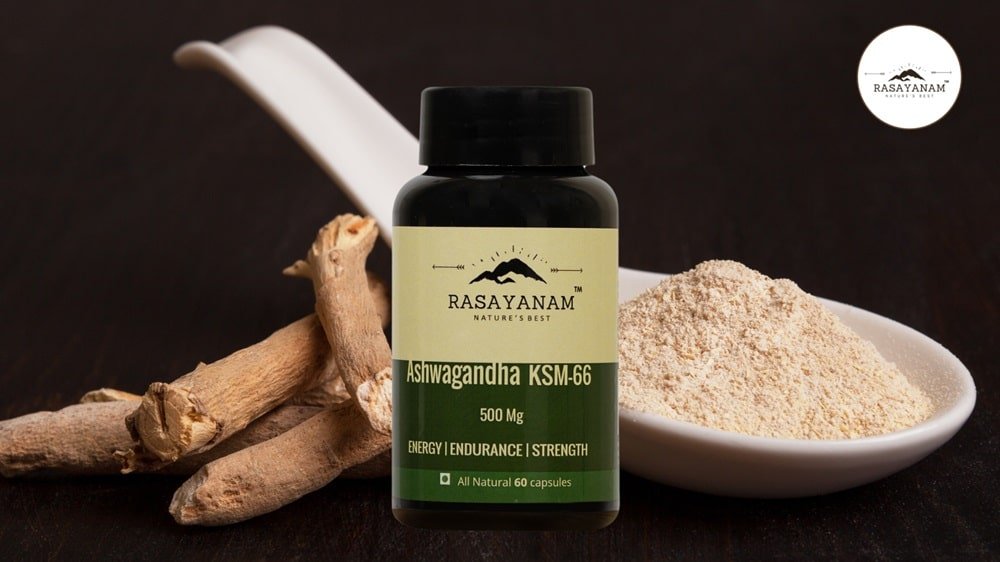Ashwagandha has been used for generations to improve general health and vigour. Some historical evidence suggests that people used Ashwagandha even in ancient times due to its ability to enhance vitality, boost energy levels, improve cognitive function, and support longevity.
It is still believed to reduce stress, increase stamina, and enhance overall well-being. The plant’s name, which translates to “smell of horse” in Sanskrit, comes from its distinct odour and reputation for providing horsepower and vigour.
Ashwagandha’s most potent form is its root, which is also regarded as Ashwagandha KSM66. Its roots contain powerful bioactive chemicals such as alkaloids and withanolides, making it even more powerful than any other natural herb. To be specific, Ashwagandha KSM66 is a form made up of roots.
Now that we know it has been used since ancient times, let’s briefly study what makes Ashwagandha so special for both men and women.
Ashwagandha Benefits for Men
Enhanced Sexual Health: Ashwagandha may boost libido, improve sperm quality, and increase testosterone levels, supporting overall reproductive wellness.
Muscle Strength and Recovery: It can enhance muscle mass, strength, and endurance, aiding in physical performance and post-workout recovery.
Stress Reduction: Ashwagandha’s adaptogenic properties help the body cope with stress, promoting relaxation and mental well-being.
Hormonal Balance: It helps regulate cortisol levels and support hormonal balance, contributing to overall health and vitality.
Ashwagandha Benefits for Women
Hormonal Balance: Ashwagandha may help regulate hormonal changes, so promoting menstrual regularity and alleviating menopausal symptoms.
Fertility Support: Studies have shown that ashwagandha may help with fertility by improving ovarian function and lowering oxidative stress.
Stress Reduction: Its adaptogenic properties aid in managing stress, anxiety, and mood swings, promoting emotional balance.
Thyroid Function: Ashwagandha may support thyroid health, regulating overall metabolism and energy levels.
Antioxidant Protection: Its antioxidant properties help combat free radicals, supporting overall health and vitality.
Now we know the uses of Ashwagandha for both men and women. Let us know on how to take it and who should avoid taking ashwagandha.

Dosage
The suggested ashwagandha dosage varies based on your needs, but most studies indicate that consuming 250-500 milligrams (mg) per day for a minimum of one month may be effective.
Read Also: Best Shilajit Brands in India
Who should avoid taking Ashwagandha?
While ashwagandha is generally regarded as safe for most individuals, some should avoid it. These include persons who have autoimmune diseases, thyroid issues and are pregnant or breastfeeding. Additionally, if you are allergic to nightshade plants, you should avoid ashwagandha.
Right time to consume Ashwagandha
There is no right time to consume Ashwagandha. You can take It at any time of day or night, but based on your goals and tolerance, you may want to take it in the morning or evening. Unlike many other supplements and drugs, ashwagandha’s benefits do not occur immediately. It can take days or weeks before you feel the benefits.
1 Can Ashwagandha help with fertility?
Ans. Yes, studies indicate that Ashwagandha may promote fertility in both men and women by promoting reproductive health, improving sperm quality, regulating menstrual cycles, and lowering oxidative stress.
2 How does Ashwagandha benefits women?
Ans. Ashwagandha benefits women by promoting hormonal balance, supporting fertility, reducing stress and anxiety, aiding thyroid function, and providing antioxidant protection for overall health and well-being.
3 What forms does Ashwagandha come in?
Ans. Ashwagandha supplements are available in a variety of formats, including capsules, powders, tinctures, and teas. Personal desire and convenience drive the form selection process.
4 Does Ashwagandha have any benefits for skin health?
Ans. Some studies suggest that Ashwagandha’s antioxidant capabilities may help protect skin from oxidative stress and promote a healthy complexion. However, further research is required to understand its effects on skin health properly.











